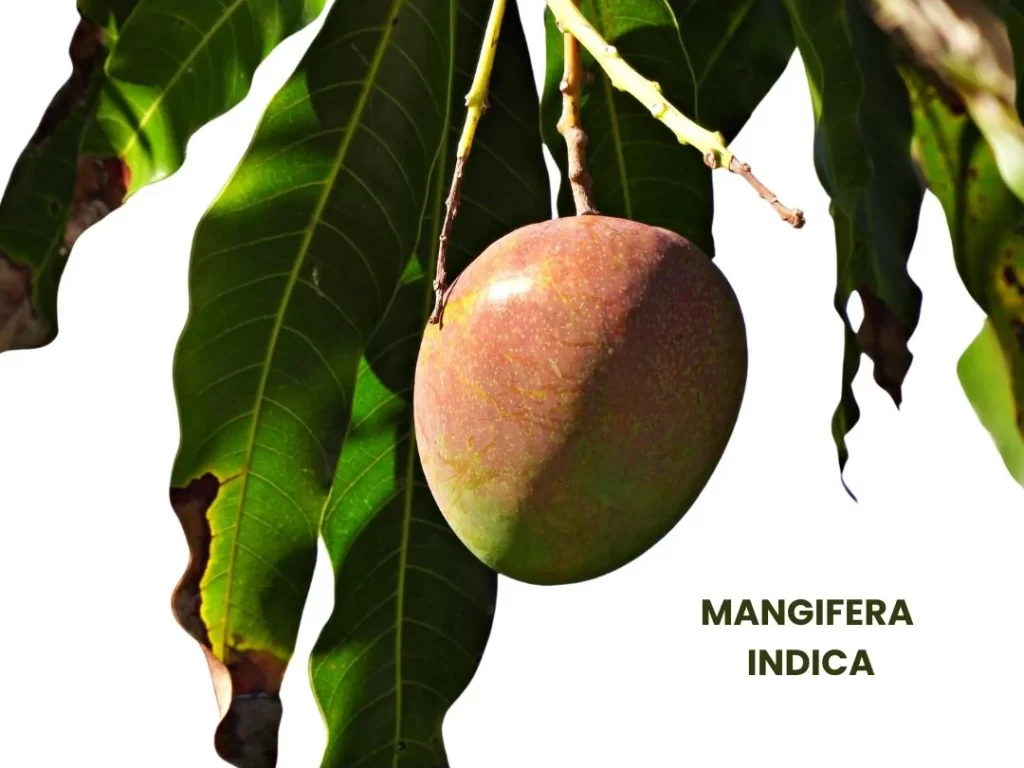Mangifera Indica, commonly known as the Mango Tree, is a versatile homeopathic remedy used for a variety of conditions, particularly passive hemorrhages, and mucous membrane relaxation of the alimentary canal.
It is also indicated for skin conditions and varicose veins.

SOURCE INFORMATION
Scientific Classification
- Kingdom: Plantae
- Clade: Tracheophytes
- Clade: Angiosperms
- Clade: Eudicots
- Order: Sapindales
- Family: Anacardiaceae
- Genus: Mangifera
- Species: M. indica
Origin and Historical Facts
- The Mango Tree, native to South Asia, is widely cultivated for its delicious fruit.
- In traditional medicine, various parts of the Mango Tree have been used for their medicinal properties, including the leaves and bark.
DRUG PATHOGENESIS
- Passive Hemorrhages: Effective for hemorrhages from various organs such as uterus, kidneys, stomach, lungs, and intestines where bleeding occurs without active blood flow.
- Mucous Membrane Relaxation: It causes relaxation and irritation of the mucous membranes lining the digestive tract, leading to catarrhal and serous discharges.
- General Relaxation: Has an affinity for relaxed muscles and poor circulation.
KEY CHARACTERISTICS
- Rhinitis and Throat Troubles: Effective for acute conditions like rhinitis (inflammation of the nasal mucosa), sneezing, and pharyngitis (sore throat), with a sensation of suffocation as if the throat might close.
- Chronic Intestinal Irritation: Indicated for chronic irritation of the intestinal tract, with catarrhal discharges and mucous membrane relaxation.
- Varicose Veins: Helps in cases of varicose veins, indicating weakness and poor circulation in the blood vessels.
- Skin: Itching of the palms, swollen skin as if sunburned, and intense itching with white spots.
- Ears and Lips: Swelling of the lobes of the ears and lips, indicating allergic or inflammatory conditions affecting these areas.
DETAILED SYMPTOMS
RHINITIS AND THROAT TROUBLES
- Rhinitis (Inflammation of Nasal Mucosa): Mangifera Indica is beneficial for acute rhinitis, where there is inflammation of the nasal mucosa leading to symptoms like nasal congestion, sneezing, and discharge.
- Patients may experience a sensation of fullness or obstruction in the nose.
- Pharyngitis (Sore Throat): It helps in cases of acute sore throat characterized by pain, irritation, and difficulty swallowing.
- There may be a sensation of suffocation or constriction in the throat, indicating inflammation and swelling of the pharyngeal mucosa.
CHRONIC INTESTINAL IRRITATION
Mangifera Indica is indicated for chronic irritation of the intestinal tract.
This condition is characterized by:
- Catarrhal Discharges: Mucous membrane irritation leading to excessive mucous secretions.
- Mucous Membrane Relaxation: The intestinal mucosa becomes relaxed and irritated, causing discomfort and sometimes diarrhea or loose stools.
- Symptoms worsen with exposure to cold or damp weather, and improve in warm, dry conditions.
VARICOSE VEINS
Mangifera Indica is used for varicose veins, which indicate weakened blood vessels and poor circulation. Key symptoms include:
- Swelling: The veins appear swollen, often with a bluish or purplish color.
- Pain: Aching or throbbing pain in the legs, especially after prolonged standing or sitting.
- Heaviness: Legs may feel heavy or tired, particularly at the end of the day.
SKIN SYMPTOMS
- Itching of Palms: Intense itching sensation affecting the palms of the hands.
- Swollen Skin as if Sunburned: Skin appears swollen and red, resembling a sunburned appearance.
- White Spots: Presence of white spots on the skin, often associated with itching and inflammation.
EARS AND LIPS
- Swelling of Ear Lobes: The lobes of the ears become swollen, indicating an allergic or inflammatory reaction.
- Swelling of Lips: Lips may also swell, accompanied by itching or burning sensations.
These symptoms collectively indicate the broad spectrum of conditions for which Mangifera Indica is prescribed in homeopathy.
It is particularly useful in acute respiratory and throat infections, chronic gastrointestinal disturbances, varicose veins, and various skin manifestations.
The remedy is chosen based on the characteristic symptoms of each individual patient, aiming to stimulate the body’s natural healing response.
MODALITIES
- Worse: Symptoms worsen in damp weather or from exposure to cold.
- Better: Improvement is noted in warm and dry conditions.
WHAT ARE MODALITIES IN HOMOEOPATHY?
RELATIONSHIP WITH OTHER DRUGS
- Compare with: Erigeron and Epilobium, which also have indications for hemorrhages and mucous membrane irritations.
DOSE
- Typically administered in tincture form.
Frequently Asked Questions
What conditions is Mangifera Indica used for?
- It is used for passive hemorrhages (uterine, renal, gastric, pulmonary, intestinal), rhinitis, acute throat troubles, mucous membrane relaxation, chronic intestinal irritation, varicose veins, and skin itching with swelling.
How should Mangifera Indica be taken?
- It is usually taken in tincture form.
- The dosage should be determined by a qualified homeopathic practitioner based on the individual’s symptoms.
Are there any specific side effects of using Mangifera Indica?
- In homeopathic dilutions, side effects are rare.
- However, it is essential to consult a practitioner if symptoms worsen or new symptoms appear.
Can Mangifera Indica be used alongside conventional medications?
- Yes, it can be used alongside conventional treatments.
- However, it is advisable to inform your healthcare provider about all medications being used to avoid interactions.
This comprehensive overview provides a detailed understanding of Mangifera Indica as a homeopathic remedy, highlighting its indications, characteristics, and usage guidelines.
